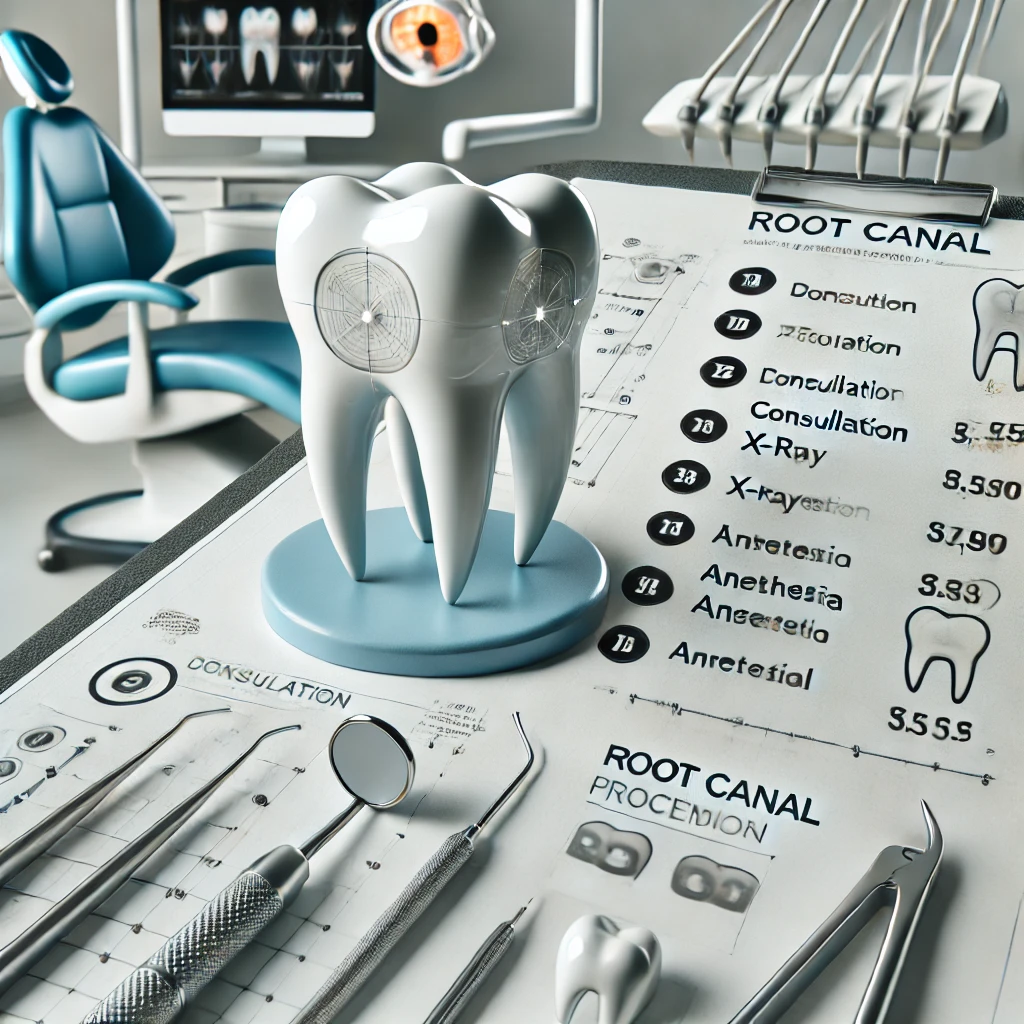Table of Contents

introduction
When facing the possibility of a root canal, one of the most common concerns, aside from the procedure itself, is the cost. Dental treatments can be expensive, and understanding the factors that affect the price of a root canal is essential to avoid any surprises when it comes time to pay.
In this article, we will explore everything you need to know about root canal costs, including factors that influence pricing, how much different types of root canals typically cost, and ways to manage the expense. Let’s dive into the details so you can make informed decisions about your dental care.
What is a Root Canal?
A root canal is a dental procedure that treats an infected or damaged tooth. The goal of the procedure is to remove the infected pulp inside the tooth, clean and disinfect the canals, and seal the tooth to prevent further infection. This process helps to save the tooth from extraction and avoid more extensive dental issues.
How Much Does a Root Canal Cost?
The cost of a root canal varies based on several factors, including the tooth’s location, the infection’s severity, and whether you see a general dentist or an endodontist (a specialist in root canals). On average, a root canal can cost anywhere from $300 to $2,500.
Average Root Canal Costs by Tooth Type
One of the main factors influencing the price of a root canal is the type of tooth being treated. Different teeth have different structures, affecting the procedure’s complexity and time required.
- Front Teeth (Incisors and Canines): These teeth are the easiest to treat because they generally have just one root canal. Root canal treatment for front teeth can range from $300 to $1,500.
- Premolars: Premolars can have one or two canals, so the procedure may be slightly more complicated. The cost for premolars usually falls between $400 and $1,800.
- Molars: Molars are the most complex teeth to treat, often having three or more canals. As a result, root canals for molars can range from $700 to $2,500.
Factors That Affect Root Canal Costs
The price of a root canal is flexible. Several factors come into play when determining the final cost of the procedure:
- Type of Tooth
As mentioned earlier, the type of tooth (front, premolar, or molar) will directly impact the cost. With their multiple roots, Molars are more time-consuming and, thus, more expensive to treat.
- Severity of the Infection
A tooth with a more severe infection may require additional treatments, such as multiple appointments to fully clean out the infection. More complex cases can lead to higher costs due to the extra time and effort involved.
- Location of the Dentist
Where you live significantly affects how much you’ll pay for a root canal. In urban areas or regions with a higher cost of living, dental treatments tend to be more expensive compared to rural or smaller communities.
- General Dentist vs. Endodontist
If you see a general dentist for the procedure, you may pay less than if you visit an endodontist who specializes in root canals. However, specialists often have more experience with complex cases and can ensure the highest level of care.
- Dental Technology
Some dentists use advanced technology such as digital imaging, rotary endodontics, or laser techniques, which can increase the cost of the procedure. While these tools may make the process quicker and more comfortable, they come with a higher price tag.
Additional Costs to Consider
The cost of the root canal itself is one of many expenses you need to consider. There are additional costs that might be necessary, depending on your individual situation.
- Dental X-Rays
Before performing a root canal, your dentist will need to take X-rays to assess the extent of the infection. X-rays typically cost between $20 and $250, depending on the type and number of images required.
- Crown Placement
After the root canal is completed, the tooth may need to be restored with a dental crown to protect it from further damage. A crown can cost anywhere from $500 to $3,000, depending on the material used and the case’s complexity.
- Follow-Up Appointments
In some cases, you may need follow-up appointments to ensure the tooth is healing properly or to finalize the placement of the crown. These visits may add to the overall cost.
Does Insurance Cover Root Canal Treatment?
Dental insurance can help reduce the out-of-pocket costs of a root canal, but coverage varies from plan to plan. Most insurance providers will cover 50% to 80% of the cost of a root canal, depending on the policy and whether you’ve met your deductible. However, if you need to see a specialist like an endodontist, insurance may cover a smaller portion, leaving you with higher out-of-pocket expenses.
It’s essential to check with your dental insurance provider to understand what your plan covers, including any limits or exclusions. Make sure to ask about the cost of crowns and follow-up appointments, as these may or may not be included in the coverage.
Ways to Save on Root Canal Costs
While root canals can be expensive, there are ways to manage the cost and make the procedure more affordable. Here are a few strategies to help reduce the financial burden:
- Dental Payment Plans
Many dental offices offer payment plans or financing options that allow you to spread the cost of the procedure over several months. This can make the expense more manageable, especially if your insurance doesn’t cover the full cost.
- Dental Discount Plans
Dental discount plans can be an alternative to insurance, offering reduced rates on dental procedures in exchange for an annual membership fee. These plans can save you 10% to 60% on root canals and other dental treatments.
- Seek Treatment at a Dental School
If cost is a significant concern, consider seeking treatment at a dental school. Under experienced professionals’ supervision, dental students can perform root canals at a reduced cost.
- Compare Prices
Prices for dental procedures can vary widely between providers. Feel free to shop around and compare prices from different dentists in your area. Just be sure to choose a reputable dentist to ensure the quality of care.
Is a Root Canal Worth the Cost?
While a root canal can be expensive, it’s often the best option for saving your natural tooth and avoiding more invasive treatments like extraction and dental implants. Compared to the long-term costs and complications of tooth loss, a root canal is a worthwhile investment in your dental health.
In addition, preserving your natural tooth can prevent other dental issues, such as shifting teeth, bite problems, and difficulty chewing, which can arise from losing a tooth.
Conclusion
Root canal costs can vary widely depending on several factors, including the type of tooth, the infection’s severity, and the dentist’s location. On average, you can expect to pay between $300 and $2,500 for the procedure, with additional costs for X-rays, crowns, and follow-up appointments.
If you have dental insurance, part of the procedure will likely be covered, but it’s important to check your policy for specific details. For those without insurance, exploring payment plans, dental discount programs, or seeking treatment at a dental school can help reduce the financial burden.
Ultimately, while a root canal may seem costly, it’s an investment in your long-term oral health and well-being, helping you avoid more serious complications.






